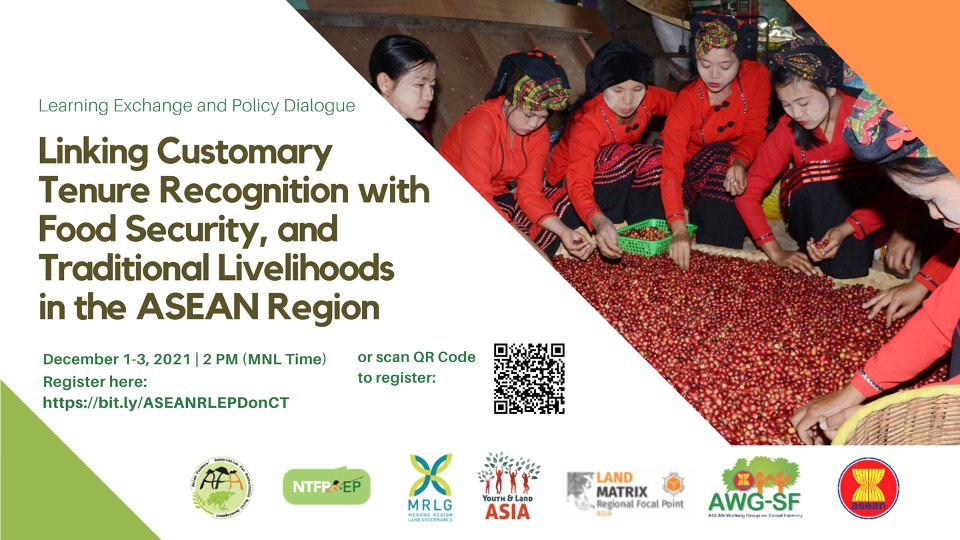Learning exchange and policy dialogue on customary tenure recognition, food security and traditional livelihoods in the ASEAN region
The Asian Farmers Association for Sustainable Rural Development (AFA), in partnership with NTFP-EP, the MRLG alliance, and the ASEAN Secretariat and the ASEAN Working Group on Social Forestry, will be conducting a Regional Learning Exchange and Policy Dialogue on Customary Tenure (CT) Recognition, Food Security and Traditional Livelihoods in the ASEAN region on December 1-3, 2021, 2PM Manila time via Zoom.
The State of the World’s Forest in 2018 underscored that clear and secured tenure rights are recognized as an important prerequisite for the sustainable management of natural resources. Tenure covers multiple rights, including at a minimum, the right to access, the right to make management decisions and the right to withdraw resources from a particular area. Over the past few years, there have been progress in the areas of tenure and safeguards at the ASEAN (regional) level, particularly in the Mekong sub-region. Free, prior and informed consent (FPIC) provisions under international and national laws, policies and programs have gained strength. Several legal reforms have been proposed, and in part adopted, in recent years on land in the region. Both customary tenure (CT) and FPIC have been recognized as key indicators in an important guideline for responsible investment in food agriculture and forestry.
However, despite these developments, several challenges remain. For customary forest tenure, access and ownership are still conditional and restricted in several cases. Land conflicts remain high. Further cases of encroachments in customary land and forests threaten customary rights and impede on traditional livelihood and customary conservation and resource management practices. In terms of safeguards, FPIC guidelines have not been developed and institutionalized in several ASEAN countries, and many development projects such as dam construction, mining, and agroindustry crops are taking place without the consent of communities. The lack of capacity and awareness by the local communities and indigenous peoples on the international and regional mechanisms that provide safeguards over community rights limit their ability to engage authorities about the adherence to these safeguards.
Based on the latest available figures collected by The Center for People and Forest, formerly the Regional Community Forestry Training Center for Asia and the Pacific (RECOFTC), the ASEAN region has approximately 10,078,435 ha of state forestland managed under official social forestry agreements or communal land titles (RECOFTC and AWG-SF, 2017). While those that have social forestry policies have a tenure system in place, tenurial rights can easily be revoked by the government depending on its priorities. Incentives for the local people to manage the forest sustainably in terms of use rights also depend on the policies of the government and the clarity of how these policies were written (Ramirez, et al., 2019).
Building on these gains and recognizing existing challenges, it is vital to continue amplifying the work towards the development, adoption and implementation of CT recognition and the use of safeguards such as FPIC in securing rights over customary forest tenure in the Mekong region through strengthening the policy and practice work (action research, analyses and assessments, capacity building and knowledge exchange) that will deliver increased capacities, key lessons, policy recommendations, and policy guidance in securing customary forest tenure and FPIC safeguards.
Learning Exchange and Policy Dialogue on Customary Tenure (CT) Recognition, Food Security and Traditional Livelihoods in the ASEAN Region
The regional learning exchange and policy dialogue is part of the project, “Strengthening regional mechanisms and capacities in engaging, implementing, and adopting CT recognition and FPIC as safeguards in the Mekong region”. It aims to contribute towards the following Outcome:
ASEAN Guidelines for CT recognition is supported, adopted, and implemented by ASEAN Member States to support national policies and legislations (Outcome 2)
In this Learning Exchange and Policy Dialogue, the organizers aim to:
- Raise awareness on the status of CT recognition in different member states of the ASEAN, focusing particularly on its intersect with food security and traditional livelihoods;
- Present to multi-stakeholder partners different views, strategies and approaches concerning policy reform on CT recognition at the national and regional levels; and
- Discuss and review the draft zero of an ASEAN Guidelines for CT Recognition and identify action points to promote its adoption at the regional and national levels.
Key Participants
- ASEAN Member State representatives working in the environment and forestry sector; government officials
- Civil society organizations – e.g., CSO Forum on Social Forestry in ASEAN, RRI, The Tenure Facility, Land Portal
- National CT alliance members
- Regional CT Alliance Members
- Indigenous people and local community representatives
- Relevant regional and national bodies – AWG-SF, ASEAN Secretariat, Steering Committee on CCFS
- Indigenous peoples’ networks and organizations
- Local communities
- Family farmers in forested landscapes in the ASEAN region (men, women, youth and IPs)
- Other development partners (e.g. FAO, International Land Coalition (ILC), IFAD etc.)
Please register to join the event here.
For more about the event and to view the programme visit the AFA website here.
